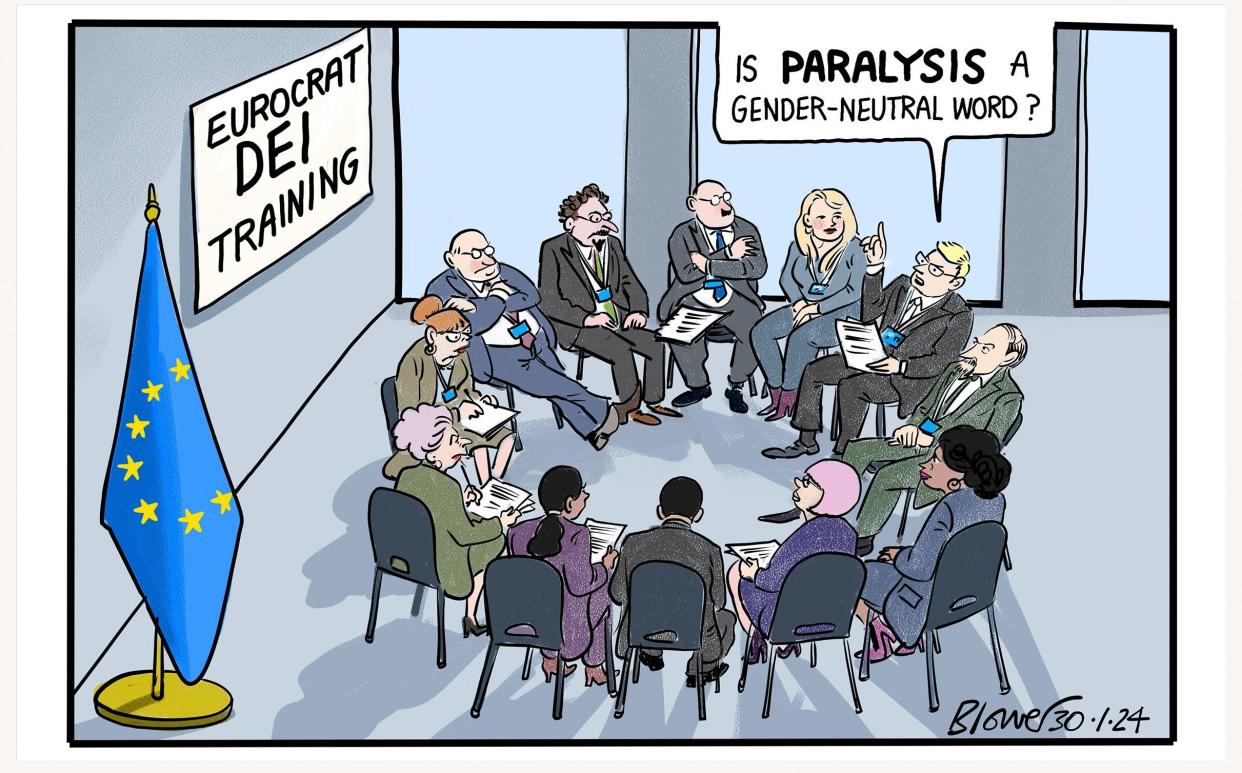The EU is more obsessed with diversity than its own survival

Does the European Union have a death wish?
Though facing mortal dangers from within and without, the EU seems more interested in diversity and gender than its own survival.
Right now, its farmers and many other workers are revolting, its economies are drowning in debt, its birthrate is collapsing, its borders are disintegrating and Putin’s legions are at the gates.
None of this bothers the bureaucrats in Brussels, however. There the European Institute for Gender Equality (EIGE), an official body dedicated to “making the European Union become a Union of Equality”, has launched a campaign to purge “gendered language” from common usage.
According to this hitherto obscure branch of EU officialdom, “no man’s land” should be replaced by “unclaimed territory” and “manpower” by “workforce”.
Even the order of phrases such as “King and Queen” or “brother and sister” should be reversed, according to the EU’s new 61-page Toolkit on Gender-sensitive Communication.
Why, though, should Brussels make such a preposterous bid to police the English language, when the UK is no longer even a member state?
The answer is that, even after Brexit, English remains one of three “procedural” languages of the EU. Not coincidentally, it is also by far the most widely spoken one, both in Europe and the rest of the world.
Hence the Eurocrats’ obsession with control of every aspect of economic, social and cultural life extends even to English, the European lingua franca.
Ironically, English is the least gendered language in Europe. In all the other major linguistic communities in the EU, nouns are gendered.
To take a few examples: French, German, Spanish, Italian and Polish are all grammatically structured by gender. This makes it extremely difficult to eliminate the “invisibility” of women in these languages.
It is true that the woke agenda, like other forms of political correctness, comes from the English-speaking world, above all the United States. The EU, however, is seeking to impose its own top-down, bureaucratic diktat upon the fundamentally democratic realm of everyday speech.
In the name of diversity, these Euro-mandarins are actually trying to make language less diverse by ordaining only one “gender neutral” form of each expression as acceptable.
They don’t even understand English terribly well. Anyone who thinks “master of ceremonies” is offensive to women and demands that we substitute “host” for it simply hasn’t grasped the fact that at many events these are two distinct roles.
Or, to take another of the EIGE’s examples, “bossy” and “pushy” have quite different connotations from “assertive”. It is indeed unfortunate that the former adjectives are often applied in a misogynistic manner, but a man who means to be critical of a woman is not going to say “assertive” instead of “bossy” just because an official says so.
Like so many other aspects of the EU, this compulsion to regulate everything has its origins in French dirigisme — an ideology designed to centralise the economy, championed by many leaders from Louis XIV and Napoleon to General de Gaulle.
The British prefer another French phrase: laissez faire. We leave words to sink or swim, allowing language to evolve by a Darwinian process of natural selection.
A generation ago, the word “chairman” was deemed by some to be sexist. Alternatives emerged — “chairwoman”, “chairperson”, “chair” — but the choice remained free and the controversy died down.
On the Continent, however, gendered language has become a battleground in a European version of American culture wars. In France, that bastion of linguistic conservatism, the Académie Française, points out that “far from attracting the support of a majority of contemporaries, [gender neutral language] appears to be the preserve of an elite”.
In Germany and Italy, the Right has latched onto the issue as a rallying cry against wokery and EU meddling. Giorgia Meloni, Italy’s first female Prime Minister, insists that journalists must refer to her office using the traditional masculine article, il Presidente del Consiglio, rather than adopting the feminine la.
Ordinary Europeans see the futility of these linguistic skirmishes between progressives and populists. Most aren’t aware that they speak gendered languages anyway, any more than Molière’s bourgeois gentilhomme Monsieur Jourdain knew that he had been speaking prose for 40 years without knowing it.
Meanwhile the gender zealots are fiddling while the Treaty of Rome burns. Do those who believe in the European idea really want to die on that hill?

